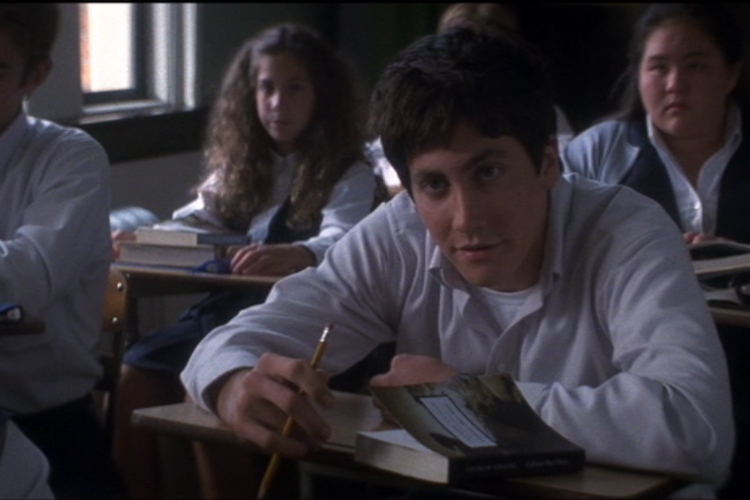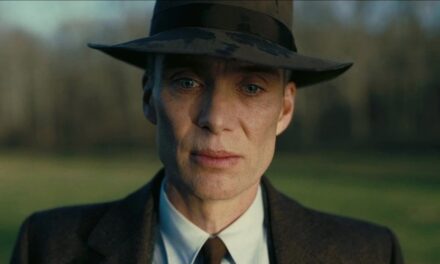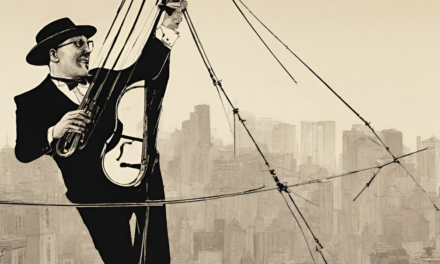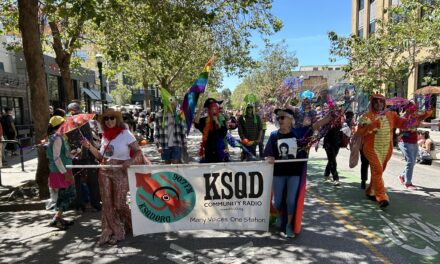
Every so often a really good movie will undeservedly fail at the box office. Bad timing, the marketing challenges of outside-the-box storytelling, or even its title can undermine theatrical success. But films that go on to develop a large and enthusiastic fan base in the home-video market are often far more interesting than profitable first-releases. If ever there were a poster child for that kind of movie, Donnie Darko would be it. Bad timing? It had its big-screen debut in 2001 shortly after the 9/11 attacks. Marketing challenges? It’s not easy to sell a coming-of-age film that has wormholes and a giant bunny. Questionable title? Even one of the characters in the film asks self-reflexively, “Donnie Darko? What kind of name is that?”
Donnie Darko is the name of the protagonist. He’s a teenaged boy who lives with his parents and two sisters in the affluent suburbs of Middlesex, Virginia, circa 1988. Donnie attends a private high school and has a crush on the new girl in town. He also sees a $200/hour psychiatrist. Donnie is troubled, possibly even schizophrenic, but sensitive and intelligent; he can deconstruct the writings of Graham Greene as easily as the mythos of Smurfs.
We first encounter Donnie waking up on a hillside road. He’s a sleepwalker, but as of late Donnie’s been lured out of bed by the voice of a stranger named Frank who appears later wearing a bizarre rabbit costume. During one of their nocturnal get-togethers, Frank warns Donnie that the world will end in 28 days. Moments later a massive jet turbine falls through the roof of the Darko residence, crashing through Donnie’s bedroom. Had he not left his bed to meet Frank, he would have been killed. Paradoxically, no jets had reported losing an engine. Where did it come from? Is Frank real or a manifestation of mental illness? Those two questions are at the center of the story while teen angst, family drama, and high school satire swirl around it.
In 2011 Donnie Darko was number three on Empire Magazine’s list of 50 Greatest American Independent Movies, just below Mean Streets and Reservoir Dogs. It’s an insanely ambitious, genre-blending first film made by Richard Kelly who was only 24 years old when he wrote and directed it. Despite Kelly’s age and lack of experience, Donnie Darko is a showcase of clever stylistic touches, inspired musical choices and interesting camerawork. For instance, an early sequence at Donnie’s high school is reminiscent of an MTV music video with normal, slow and fast camera speeds timed to the ‘80’s pop classic, Head over Heels, effectively establishing the time, place, characters and relationships, as well as creating a visual tie-in to one of the story’s more mind-bending conceits: the manipulation of time.
Jake Gyllenhaal, with an impish grin that exudes boyish charm, gives a breakout performance as Donnie Darko. The stellar supporting cast includes Jake’s real life sister, Maggie Gyllenhaal, Mary McDonnell as his mother, Katherine Ross as his psychiatrist, Seth Rogen as a high school bully, and Patrick Swayze as a pop-psych guru. Providing some John Hughes-styled comic relief are Beth Grant and David Moreland as a P.E. teacher and school principal. The ensemble’s one weak link is Drew Barrymore who also served as executive producer. Barrymore is unconvincing as one of Donnie’s teachers, and her attempts to sound like an intellectual feel awkward. But that’s a minor quibble. Donnie Darko is one of the best films of 2001.
For KSQD’s Film Gang, this is Paul Kanieski












